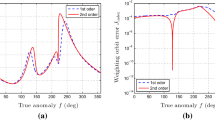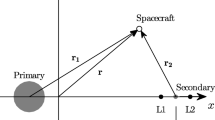Abstract
A novel simplified parametric model for long-duration impulsive orbit rendezvous is proposed. Based on an existing fast estimation method, the optimal impulses and trajectory can be expressed by only ten parameters whose initial values can be easily determined. Then, these parameters are used to predict orbital deviations with a target orbit. A simple correction process is designed to sequentially update the parameters based on the J2 perturbed analytical dynamic equations of circular orbits. Finally, an iteration loop is formed to obtain the precise parameters and optimal trajectory. The simulation results confirm that the simplified parametric optimization method can be applied to elliptical orbits of small eccentricity and adapts well to both analytical and high-precision dynamics. The deviations could always converge within five iterations and the calculation was more efficient than the existing methods.

Similar content being viewed by others
Change history
11 February 2022
A Correction to this paper has been published: https://doi.org/10.1007/s42064-022-0136-2
References
Abolfazl, S., Josu, C., Jose, A. Spacecraft trajectory optimization: A review of models, objectives, approaches and solutions. Progress in Aerospace Sciences, 2018, 102: 76–98.
Arlulkar, P. V., Naik, S. D. Solution based on dynamical approach for multiple-revolution lambert problem. Journal of Guidance, Control, and Dynamics, 2011, 34(3): 920–923.
Prussing, J. E. Optimal two- and three-impulse fixed-time rendezvous in the vicinity of a circular orbit. AIAA Journal, 1970, 8(7): 1221–1228.
Prussing, J. E., Chiu, J. H. Optimal multiple-impulse time-fixed rendezvous between circular orbits. Journal of Guidance, Control, and Dynamics, 1986, 9(1): 17–22.
Handelsman, M., Lion, P. Primer vector on fixed-time impulsive trajectories. AIAA Journal, 1968, 6(1): 127–135.
Riggi, L., D’Amico, S. Optimal impulsive closed-form control for spacecraft formation flying and rendezvous. In: Proceedings of the American Control Conference, 2016: 5854–5861.
Fossa, A., Bettanini, C. Optimal rendezvous trajectory between Sample Return Orbiter and Orbiting Sample Container in a Mars Sample Return mission. Acta Astronautica, 2020, 171: 31–41.
Gurfil, P. Analysis of J2-perturbed motion using mean non-osculating orbital elements. Celestial Mechanics and Dynamical Astronomy, 2004, 90(3–4): 289–306.
Vallado, D. Fundamentals of Astrodynamics and Applications, 2nd edn. El Segundo, USA: Microscosm Press, 2001.
Ocampo, C., Guinn, J., Breeden, J. Rendezvous options and dynamics for the mars sample return mission. Advances in the Astronautical Sciences, 2002, 109: 1661–1680.
Labourdette, P., Baranov, A. A software for rendezvous between near-circular orbits with large initial ascending node difference. In: Proceedings of the 17th International Symposium on Space Flight Dynamics, 2003: 130–142.
Zhang, J., Tang, G., Luo, Y. Optimization of an orbital long-duration rendezvous mission. Aerospace Science and Technology, 2016, 58: 482–489.
Casalino, L., Dario, P. Active debris removal missions with multiple targets. In: Proceeding of the AIAA/AAS Astrodynamics Specialist Conference, 2014: AIAA 2014-4226.
Zhang, G., Mortari, D., Zhou, D. Constrained multiple-revolution Lambert’s problem. Journal of Guidance, Control, and Dynamics, 2010, 33(6): 1779–1786.
Armellin, R., Gondelach, D., San-Juan, J. F. Multiple revolution perturbed Lambert problem solvers. Journal of Guidance, Control, and Dynamics, 2018, 41(9): 2019–2032.
Zhang, G., Wang, X., Ma, X. B., Tang, Y., Huang, H. B. Spacecraft long-duration phasing maneuver optimization using hybrid approach. Acta Astronautica, 2012, 72: 132–142.
Cerf, M. Multiple space debris collecting mission: Optimal mission planning. Journal of Optimization Theory and Applications, 2015, 167(1): 195–218.
Huang, A. Y., Luo, Y. Z., Li, H. N. Fast estimation of perturbed impulsive rendezvous via semi-analytical equality-constrained optimization. Journal of Guidance, Control, and Dynamics, 2020, 43(12): 2383–2390.
Price, K. V., Storn, R. M., Lampinen, J. A. Differential Evolution: A Practical Approach to Global Optimization. Berlin, Germany: Springer, 2005.
Petropoulos, A., Grebow, D., Jones, D., Lantoine, G., Nicholas, A., Roa, J., Senet, J., Stuart, J., Arora, N., Pavlak, T., et al. GTOC9: Results from the Jet Propulsion Laboratory (Team JPL). Acta Futura, 2018, 11: 25–35.
Chen, S., Jiang, F., Li, H., Baoyin, H. Optimization for multitarget, multispacecraft impulsive rendezvous considering J2 perturbation. Journal of Guidance, Control, and Dynamics, 2021, 44(10): 1811–1822.
Acknowledgements
The work was supported by the National Natural Science Foundation of China (No. 11972044).
Author information
Authors and Affiliations
Corresponding author
Additional information
An-Yi Huang received his B.S. (2008) and M.S. (2012) degrees from the School of Aerospace Engineering, Tsinghua University, Beijing, China. He is currently pursuing his Ph.D. degree in aerospace engineering at the National University of Defense Technology. His research areas include spacecraft dynamics and trajectory optimization. E-mail: hay04@foxmail.com.
Ya-Zhong Luo received his B.S., M.S., and Ph.D. degrees in aerospace engineering from the National University of Defense Technology, China, in 2001, 2003, and 2007, respectively. Since December 2013, he has been a professor at the National University of Defense Technology. His current research interests include manned spaceflight mission planning, spacecraft dynamics and control, and evolutionary computation. E-mail: luoyz@nudt.edu.cn.
Rights and permissions
About this article
Cite this article
Huang, AY., Luo, YZ. & Li, HN. Fast optimization of impulsive perturbed orbit rendezvous using simplified parametric model. Astrodyn 5, 391–402 (2021). https://doi.org/10.1007/s42064-021-0126-9
Received:
Accepted:
Published:
Issue Date:
DOI: https://doi.org/10.1007/s42064-021-0126-9




